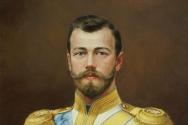(Goncharov I. A.)
In Russian literature of the second half of the 19th century one can find a lot interesting characters. But, it seems to me, the most colorful and controversial is Ilya Ilyich Oblomov - main character novel of the same name by I. A. Goncharov. “How many people - so many opinions” - says folk wisdom. Everyone can evaluate Ilya Ilyich in accordance with their feelings. I think Oblomov is a good person.
This opinion was formed after assessing the relationship of the main character with other characters in the novel. Oblomov cannot be imagined outside the sofa. The essence of Ilya Ilyich is clearly manifested precisely at home, where he lives with an old servant.
The main character treats Zakhar well and in a friendly manner, whom he has known since childhood. Sometimes he makes “pathetic scenes”, but goes no further. Even when he notices the old man’s theft, he doesn’t focus on it. special attention. Lazy Oblomov knows that he cannot exist alone, and that is why he loves Zakhar for his patience. WITH early childhood The main character's friend is Andrei Ivanovich Stolts.
What could be interesting for the energetic and independent Stolz in Oblomov? Andrei Ivanovich appreciates Ilya Ilyich for his intelligence, simplicity, tenderness and sincerity and “pulls” the hero out of various kinds of “scrapes”. For this, Oblomov loves and respects Stolz immensely. In addition, Andrei Ivanovich introduces Ilya Ilyich to Olga Ilyinskaya.
Oblomov does not pursue low goals in his relationship with the young lady. Everything in his soul happens simply and naturally. If Oblomov’s thoughts and phrases spoken to Olga belonged to someone else, they could be considered vulgarity and pretense. But we understand the sincerity of Ilya Ilyich: “Olga realized that the word had escaped from him... and that it was the truth.”
Ilyinskaya herself, who at first only wanted to rise in her own and others’ eyes with the help of the hero, falls in love with such a meek, decent, somewhat naive man. He is truly "different". Ilya Ilyich thinks about strangers, even if it is unprofitable for him.
So that, God forbid, he does not disappoint an inexperienced girl in her feelings, he is even ready to give up his love: “In front of you is not the one you were waiting for, about whom you dreamed...” Oblomov, first of all, thinks about strangers, he is afraid that they will be disappointed in him . This is the defining line of Ilya Ilyich’s relationship with other characters in Oblomov. His house is very rarely empty.
Everyone enjoys the company of the hero. Oblomov does not refuse anyone anything: whoever needs advice, gives advice; anyone who needs something to eat will be invited to dinner. Tarantiev always takes from Ilya Ilyich everything he needs: a tailcoat... Its simplicity gives some reasons for fraud, but it seems that God himself is on the side of the hero.
Oblomov comes out of every scrape safely. They forced him to sign a “loan letter” - Stolz saved him, they sent a swindler to the estate - Stoltz saved him, his relationship with Olga didn’t work out, Stoltz didn’t help - he found Agafya Matveevna. Nothing can distract Ilya Ilyich from “peace and peaceful fun.”
Goncharov showed an intelligent, calm, decent, simple, at the same time capable of love, sincere, somewhat naive hero, for whom “lying down is a way of life.” Can a person endowed with such qualities be bad? I think not. Moreover, so wonderful hero I have never seen it in any work of literature. You might think that if a uniquely positive character exists, he will definitely be “superfluous,” but this only seems so.
Oblomov left behind a living reminder - Andryushenka. After the death of Ilya Ilyich, Agafya Matveevna thought about her aimless life. Olga was formed as a person as a result of Oblomov’s influence. It is not for nothing that both Agafya Matveevna and the Stoltsy spouses remember the already deceased hero every day. A good person, especially if he is Oblomov, cannot live without a trace.
But we see that this is not so. Therefore I believe that good man can't be superfluous.
The main character of the most famous novel by I. Goncharov and the man who gave the name to the concept of “Oblomovism”. “Oblomov” appeared in the mid-19th century at a time when changes in the field of serfdom were already brewing in the country. Ilya Ilyich is described by the author as a typical representative of the middle-aged nobility, who grew up in such pampered and easy conditions that he subsequently could not solve a single problem in his life.
Since childhood, the hero was looked after and protected from the slightest abrasion and physical labor. That is why he grew up to be such a lazy and unadapted person, incapable of further development. Any decision was difficult for him, and he did not set goals at all, since he knew in advance that he would not be able to achieve them. This hero cannot be imagined outside the sofa. His entire life is spent away from society in voluminous dreams and aimless reflections. It is important to note that inaction is conscious choice hero.
He sees no point in haste, in any socially useful activity, in friendly meetings, parties, or new acquaintances. He himself is not able to manage the property that he inherited. The servants do everything for him, and his closest servant Zakhar is as lazy as Oblomov himself. Can the main character be called a good person? In my opinion, yes and no. On the one hand, he is very kind, open and welcoming. He doesn't hold a grudge against anyone and doesn't wish it on anyone.
On the other hand, he commits the greatest evil towards himself. He deliberately does not strive for spiritual and physical development, since it is much easier to remain an unindependent, infantile child. Even having met love on his way, he quickly gives up because he understands that he is not able to change. Olga Ilyinskaya is trying with all her might to pull him out of the “bummer”, which has reliably taken possession of the hero’s soul and body, and at first she succeeds. However, over time, he again plunges into his thoughts, occupies the same sofa and constantly walks around in the same robe.
Oblomov's path is predictable. He never became a noble official, was never able to arrange his life with the woman he loved, and was unable to arrange his own life. As a result, Agafya Pshenitsyna took over all the housework and became his wife. It seemed that he would live a hundred years for his decency and kindness. However, after a few years of married life, he died, bequeathing his son to the Stolts. He personally asked Stolz to take care of little Andryusha, because he understood that he and Olga, as active people, would be able to raise the boy as a worthy person.
>Works based on the work of Oblomov
Is Oblomov a good person?
Oblomov Ilya Ilyich is the main character of the most famous novel by I. Goncharov and the man who gave the name to the concept of “Oblomovism”. “Oblomov” appeared in the mid-19th century at a time when changes in the field of serfdom were already brewing in the country. Ilya Ilyich is described by the author as a typical representative of the middle-aged nobility, who grew up in such pampered and easy conditions that he subsequently could not solve a single problem in his life.
Since childhood, the hero was looked after and protected from the slightest abrasion and physical labor. That is why he grew up to be such a lazy and unadapted person, incapable of further development. Any decision was difficult for him, and he did not set goals at all, since he knew in advance that he would not be able to achieve them. This hero cannot be imagined outside the sofa. His entire life is spent away from society in voluminous dreams and aimless reflections. It is important to note that inaction is a conscious choice of the hero.
He sees no point in haste, in any socially useful activity, in friendly meetings, parties, or new acquaintances. He himself is not able to manage the property that he inherited. The servants do everything for him, and his closest servant Zakhar is as lazy as Oblomov himself. Can the main character be called a good person? In my opinion, yes and no. On the one hand, he is very kind, open and welcoming. He doesn't hold a grudge against anyone and doesn't wish it on anyone.
On the other hand, he commits the greatest evil towards himself. He deliberately does not strive for spiritual and physical development, since it is much easier to remain an unindependent, infantile child. Even having met love on his way, he quickly gives up because he understands that he is not able to change. Olga Ilyinskaya is trying with all her might to pull him out of the “bummer”, which has reliably taken possession of the hero’s soul and body, and at first she succeeds. However, over time, he again plunges into his thoughts, occupies the same sofa and constantly walks around in the same robe.
Oblomov's path is predictable. He never became a noble official, was never able to arrange his life with the woman he loved, and was unable to arrange his own life. As a result, she took on all the housework
Ilya Ilyich Oblomov is not a character about whom we can say that he is a good or, conversely, a bad person. The simultaneous simplicity and complexity of character gives rise to the ambiguity of the hero. To understand this unrealized personality, you need to analyze both the positive and negative aspects of the hero’s character.
In the novel, Ilya Ilyich does not decide anything on his own, hoping for help from the outside - Zakhar, who will bring him clothes or food; Stolz, who is capable of solving his problems in Oblomovka, Tarantiev, who, although he will deceive, will himself understand the situation that interests Oblomov, etc.
The hero is not interested in real life, it makes him bored and tired, he does not need the vibrant energy of everyday life, he does not want to “scatter” his life in the bustle of society. He finds true peace and satisfaction lying on the sofa, in a world of illusions invented by himself. But even his dreams are directed to the past, even the future that he draws for himself is echoes of a distant past that can no longer be returned. Oblomov is lazy, lives in an untidy apartment, a sort of hero - a lump, deprived in childhood of the most important thing - knowledge of the world through its opposite, dreams and memories, because of this he was absolutely unprepared for the real world. Deprived of will, the ability to fight for his place in the sun and perseverance, Oblomov is afraid of life, and the very first failure becomes the last for the hero - he no longer wants to move forward and hides from the “cruel” real world in his dreams.
Positive aspects of character begin to emerge during Oblomov’s interaction with his active, active and purposeful friend, Andrei Ivanovich Stolts. Stolz is practically the only character that he saw in Oblomov positive features: sincerity, kindness, the ability to feel and understand another person’s problem, inner peace and simplicity. Oblomov’s dove-like tenderness, sensuality and sincerity are also revealed during his relationship with Olga. He is the first to realize that he cannot give Olga the happiness she dreams of. Although perhaps it was just cowardice in the face of change, he nevertheless realizes that he is not suitable for the girl and drags her along with him to Oblomovka.
Oblomov is too soft and sensitive by nature a person who failed to find his place in real life, but the reason is not a fatal combination of circumstances or a difficult fate, but in improper upbringing. I can't name Ilya Ilyich bad person, can you really call a child bad for his dreams? But you can’t call him good either.
The usual point of view: Oblomov is a lazy gentleman, rotting from idleness and unwillingness to do anything on his estate with a faithful servant. But you can look at the novel from the other side. This is a wonderful example in Russian literature of a hero who does nothing in the name of an idea, duty, or responsibility. A person who simply lives and loves in the circumstances life offers him. Yes, he doesn’t want to change anything, he sleeps a lot, eats deliciously, but wouldn’t many of us want to live like this for at least one day, not burdened by the weight of real life? Life is not always and not for everyone a struggle, aspiration, passion. Some people don’t want to make revolutions, they just want to live. So is it possible to judge him? He is neither good nor bad. He just a common person, living for himself.
Oblomov is kind to everyone and deserves boundless love.
A. V. Druzhinin
Can a good person be “extra”? In order to answer this question, let us turn to the personality of the main character of I. A. Goncharov’s novel “Oblomov”.
Ilya Ilyich Oblomov is a man of a broad soul and gentle disposition.
You can learn about the origins of his character by reading “Oblomov’s Dream,” which shows the circumstances that shaped the hero’s personality from early childhood: “His childish mind observes all the phenomena taking place in front of him; they sink deep into his soul, then grow and mature with him.” . In Oblomovka, where life passed slowly and unnoticed, everyone had their own worries, but it “cost them cheap, without bloodshed.” spends here best years little Ilya, in the caress of his mother and under the supervision of a nanny; in eternal peace he continues to draw the pattern of his own life, just as a cloud floats according to the disturbance of the wind.
In society, Oblomov is an indispensable interlocutor, endowed with the ability to listen and understand others. The rest of the characters express a completely favorable opinion about him: “He should live a hundred years.” Ilya Ilyich is valued for his good nature and decency; they come to him to ask for advice, and Oblomov will not refuse anyone, he will always listen, but he himself is indifferent to the interests modern people and denies any help in “getting myself off the couch.” Friends promise great success in social life, but Oblomov is far from the noisy bustle of society; he prefers peace in everything.
Love, perhaps, occupies the main place in Oblomov’s life, but in alliance with him, Olga Ilyinskaya becomes the “guiding force”, and the barely born feeling fades, like a broken branch...








